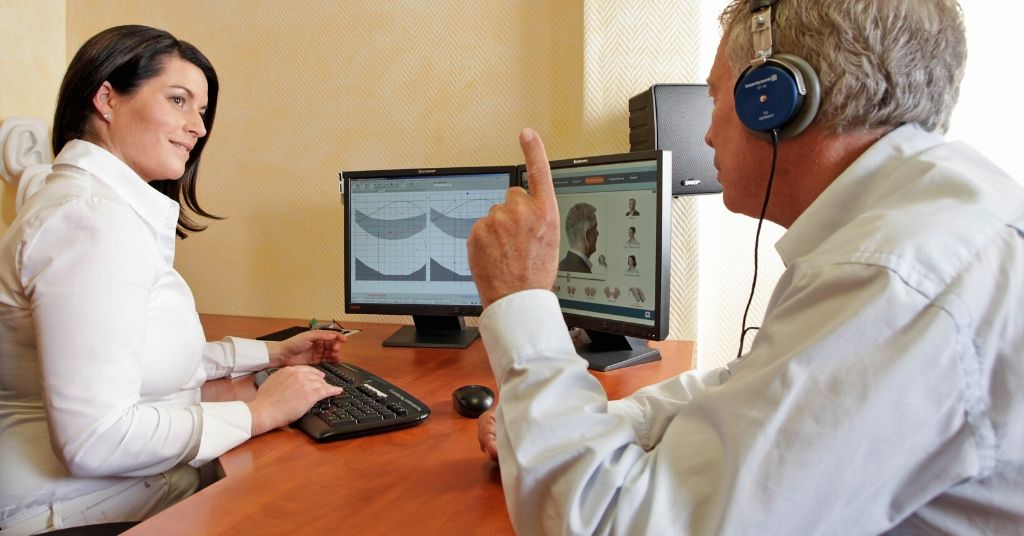
Study: COVID can infect the inner ear causing hearing loss
November 10, 2021
Osteoporosis and the risk of hearing loss in women
November 15, 2021Do’s and don’ts for medical practitioners of deaf patients

I started wearing hearing aids in my mid-20’s. I’ve often struggled with the simplest of things like seeking medical care. You’d think healthcare providers would be more supportive, or at least more aware, but unfortunately in my experience, they often lack information to support deaf and hard of hearing patients.
If accessing medical care is difficult, show your healthcare provider this article on dos and don’ts for medical practitioners and ask them to bear some of these things in mind.
Do’s and don’ts for medical practitioners of deaf patients
DO: Speak Normally
One thing that really frustrates hard of hearing individuals is when people speak extra loudly or enunciate every word really clearly. Sometimes they even come up with over the top facial expressions. Distorting your face makes it harder to hear, as it distorts the sounds, and makes it difficult, sometimes impossible, to lipread.
The easiest way for someone with a hearing loss to understand what you’re saying is to speak normally, with normal facial expressions.
DON’T: Assume
Many people make the mistake of assuming someone can understand American Sign Language (ASL) or read lips. Just because someone is hard of hearing or deaf doesn’t mean they can understand sign language. The best way to communicate with a deaf patient is to find out what types of communications they understand before making an assumption.
The best way to communicate with a deaf patient is to find out what types of communications they understand before making an assumption.
DO: Ensure I’ve Understood
Many people with hearing loss nod and bluff their way through conversations – especially if they are still coming to terms with their diagnosis and don’t have proper hearing technology. It can take a long time to gain the confidence to ask for something to be repeated. However, with medical appointments, the conversations are crucial. Both the physician and patient needs to ensure they’ve understood.
Read more: 5 Tips for attending a doctor’s appointment with a hearing loss
DON’T: Patronize
It’s easy to slip into patronizing mannerisms or ways of speaking when communicating with someone who has hearing loss, especially when you don’t find yourself in this situation often. However, this can be offensive, insulting, and makes people uncomfortable. It also makes it harder to hear and/or lipread, so it doesn’t benefit either of us.
DO: Allow Me Extra Time to Understand
One of the best things doctors or medical professionals can do for hard-of-hearing patients is allow extra time in their appointment for conversation. Because things may need to be repeated or even written down, conveying information will often take longer, especially with complicated medical jargon. Please allow for the extra time that will take.
DON’T: Speak Quickly
Typically, patients will at least be able to keep up with the speed of conversation, but deaf and hard of hearing patients struggle if conversations are too rapid. Medical jargon is a particular problem because the words are much more complicated. They aren’t words we hear every day. Most people with hearing loss understand familiar words because we’ve learned to recognize the sound and facial shapes associated with them. However, in a medical conversation, you’re presenting patients with a stream of words they might not have heard before. Therefore, they have to learn how to hear them.
Read more: Decoding a new language: Audiology terms explained
DO: Be Patient
Patience is crucial when dealing with patients with hearing loss. Even if it’s the end of a long day, or we’re discussing something really simple, please try and remember that they need you to be a little more patient and slow down.
DON’T: Rely on Phone Conversations
It seems obvious, but many hard-of-hearing individuals have a difficult time using the telephone. Online booking is a more convenient option, and so is email access to the appointments desk. Recorded messages given over the phone on things like COVID-19 alerts might not work for deaf patients.
Read more: Healthcare providers and accessible communication
DO: Offer Alternatives to Audio
Audio bookings systems can be complicated since many deaf patients rely heavily on lipreading at the front desk and a visual cue in the waiting room. Without this, it can be challenging for them to navigate the clinic. Consider providing a screen telling patients when it’s their turn and which room to go to, or make it clear that they can ask at reception for someone to collect them, as opposed to having their name called.
DON’T: Hurry Patients After an Appointment
Please allow deaf patients a little extra time when you’re wrapping up a consultation with them. It’s often helpful to linger at the door and double check that they’ve got everything together in their head before they leave. It also allows both the patient and doctor a chance to ensure they leave with all the correct medical information.
As patients, we know doctors are busy, but it can be really helpful if physicians follow these guidelines for medical practitioners of deaf patients.



